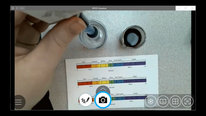Northern New Mexico STEM Mentor Collective
NSF Awards: 1649296
2017 (see original presentation & discussion)
Grades 6-8, Grades 9-12, Undergraduate
The Northern New Mexico STEM Mentor Collective addresses the problem of low STEM aspirations and expectations by empowering undergraduate STEM majors to serve as sustained STEM role models in the schools and libraries where they grew up. In this brief video we meet participating mentors, school students and teachers and view the program's impact through the eyes of both our college president and our congressional representative.
Mathematics, Science, Engineering
Northern NM Coll
Inclusion across the Nation of Communities of Learners of Underrepresented Discoverers in Engineering and Science (INCLUDES)
Related Content for Paving STEM Pathways with Natural STEM Mentors
-
 2018Curriculum and Community Enterprise for New York Harbor
2018Curriculum and Community Enterprise for New York Harbor
Dr. Lauren Birney
-
 2017Hands-on learning res. that benefits the economy, environ.
2017Hands-on learning res. that benefits the economy, environ.
Dr. Lauren Birney
-
 2017STUDIO: Build Our World
2017STUDIO: Build Our World
Leslie Herrenkohl
-
 2020Environmental Restoration Science Research; New York Harbor
2020Environmental Restoration Science Research; New York Harbor
Dr. Lauren Birney
-
 2017reimagineSTEM
2017reimagineSTEM
April Lindala
-
 2022Rural Integrated STEM Education (RISE) Ready
2022Rural Integrated STEM Education (RISE) Ready
Corin Slown
-
 2020Student Voice: Solving the Puzzle of STEM Persistence
2020Student Voice: Solving the Puzzle of STEM Persistence
Sue Ann Heatherly
-
 2021Virtual Science Teaching Strategies in Response to Pandemic
2021Virtual Science Teaching Strategies in Response to Pandemic
Sabrina Stanley
This video has had approximately 120 visits by 94 visitors from 36 unique locations. It has been played 96 times as of 05/2023.
Map reflects activity with this presentation from the 2017 STEM for All Video Showcase: Research and Design for Impact website, as well as the STEM For All Multiplex website. 
Based on periodically updated Google Analytics data. This is intended to show usage trends but may not capture all activity from every visitor.
show more
Discussion from the 2017 STEM for All Video Showcase (8 posts)

Steve Cox
Assistant Professor
Greetings STEM Outreach Advocates. I look forward to your observations, discussion and advice on STEM Mentoring programs for K12 students and STEM service learning programs for undergraduates.
Yours, Steve Cox
Michael Stone
Director of Innovative Learning
Obviously this is in the weeds and wouldn't make sense to include in the video, but can you provide us with an idea of how often the mentors work with the mentees? Also, I assume you are tracking the impact of the mentorships on the K-12 students, but do you also anticipate the program will positively impact the undergraduate mentors?
Steve Cox
Assistant Professor
Dear Michael,
Thanks for you note. The mentors see their proteges weekly for one or two hours either in class or over lunch or after school. All of these meetings taking place at the middle or high school.
Yes, following the research on service learning we are tracking the impact of serving as mentors on our undergraduate population.
Yours, Steve
Janet Kolodner
Regents' Professor Emerita
Hello Northern Mexico Team,
This program seems to have so many nice elements -- college students who have struggled in their own lives as mentors, kids from the local community who may not be thinking about college, and a venue that is local so kids can easily get to it and a place of higher learning that is not beyond what they can imagine aspiring to. I have lots of questions. (1) I wonder, as Michael does, about some of the details -- how often the kids come, what the programming is, how often they attend, how often the mentors work with the mentees, whether the mentors have particular kids assigned to them, ... (2) I wonder what you are documenting and how you are keeping track of what can be learned from your experience so that you will be able to refine it over time and so that you will be able to write it up so others can duplicate it in their own places of residence. (3) I wonder what you have learned already about the ins and outs of making a program like this work.
Steve Cox
Assistant Professor
Dear Janet,
Thanks for your great questions. We support school teachers in math, biology, computing and robotics. By entering classrooms with one college professor and 3 to 4 college students we facilitate hands-on science. By visiting the same class every week we create bonds between mentors and the school kids. In this, our first year, we are establishing ties with school teachers and administrators and other youth development leaders in our community. We are also collecting a slew of data - largely centered around attitudes toward learning and serving and taking responsibility for ones learning. The key lesson learned so far is that it is far better to integrate our offerings into existing required school classes than to offer them on some volunteer basis.
Yours, Steve
Selena Connealy
NNMC--thanks for your important work that you do! I am especially interested in considering how colleges in rural areas can support STEM learning. It's amazing that you have a maker space in Dixon!
Chris Thorn
Director of Knowledge Mangement
Steve - I like the answers to Janet's questions. The video tells a compelling story about the impact on school students and on the mentors. What's the impact been on the university faculty? You insight about working into existing courses seems like something that could inform a broad range of folks at the university. Do you think your project will have that notion stick with your university colleagues?
Janet Kolodner
Regents' Professor Emerita
Excellent question!!!
Further posting is closed as the event has ended.